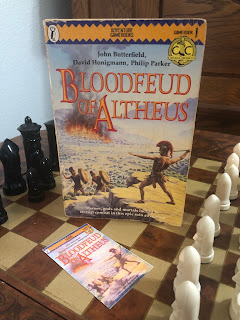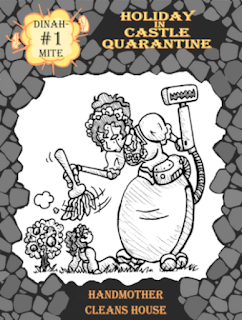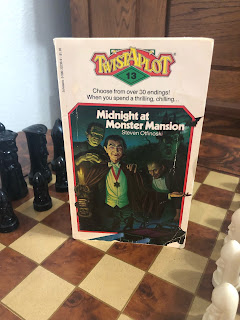Cretan Chronicles 1: Bloodfeud of Altheus
"Your twip to Cwete will now be vewy wough."
I have mixed feelings about the first volume of Cretan Chronicles, Bloodfeud of Altheus. It manages to strike a perfect balance of great and terrible, and anyone who has read it will probably already know what I'm on about.
This post will record my general impressions of the book and its contents, rather than a professionally organized review, since I try to avoid spoiling things too much for people who are interested in the books I blog about. Also because I tend to write these posts late in the evening before I go to bed.
The most obvious plus about this series is that it eschews the tired old medieval European fantasy setting in favor of ancient Greece and Greek mythology. I can't stress enough just how refreshing this is, and as a mythology nerd I was thrilled when this trilogy finally arrived in the mail so I could sink my teeth into it.
In fact the story retcons a lot of myths so that you, the be-all catch-all champion Altheus, battle the Marathon bull and brave the Minotaur's labyrinth and endlessly anger the petty gods of the Greek pantheon.
Cretan Chronicles is like Fighting Fantasy, in that it is more of a solo RPG adventure than a CYOA-styled gamebook. You have stats to keep track of, as well as an inventory and your relationships with the gods.
Your four stats for this adventure are Might, Protection, Honor, and Shame. Might is your combat stat and determines how hard you hit when attacking. Likewise Protection is your defense against getting spears in the face and bull horns in the buttocks. You earn Honor from doing cool deeds, like beating monsters in fights and helping people in need. You can spend honor to fight better or to ask the gods for help at specific points in the story. Without Honor you might be ignored by the gods or become a social outcast.
Shame is the one you collect by doing disgraceful things, such as running away from a fight, or incorrectly performing a ritual you were never told how to perform in the first place, or whenever the authors decide to arbitrarily screw up your life for no reason. Once I was on my way to the temple of Apollo, and the gatekeepers said I had to pay to enter the city by giving up money, offering a gift, or plowing the nearby fields. Well, actions speak louder than words, so I opted to do a good deed to impress the guards. When I finished plowing the fields, however, everyone laughed at me, and I learned that I'd just been tricked into plowing Apollo's sacred fields as a joke. I'd just arrived on Apollo's doorstep and he already hated my guts. So much for asking a favor from him.
At least that made sense, though. Sometimes things happen that earn you Shame for no reason whatsoever, and there's no way to predict it to avoid it. I understand being shamed for running away from a fight. That makes sense. But what about helping a man being harried by winged Furies? Help him and get shamed for interfering with divine retribution. Leave him be, and get shamed as he curses you. You can't win!
If your Shame ever outweighs your Honor, you are required by divine law to kill yourself immediately, and your adventure ends. I lost count of the times this happened, and between Shame screwing me over and the fights being unfairly stacked against me, I ended up cheating my way through the adventure just to see how long it took to get through it.
Yeah, I said it. I cheated. Judge me all you want. These books are ridiculously hard. You will lose every other fight because you're just as easy to kill as the monsters, or would be if they didn't almost always have more Protection than you. My dad sent me to kill the Marathon bull as part of my destiny, and at this point I hadn't found a weapon upgrade, nor a piece of armor, by the time I bumbled into the bull itself and had to fight it. Is running away and coming back later with better equipment an option? Nope! I had to kill it on sight or get smote by Zeus for cowardice. What's that? Mathematically impossible for you to land a hit on it? Too bad. Eat your destiny and like it!
In that regard, the book is a pretty good simulation of being at the mercy of Fate and the gods. Doesn't make for a fun read, though.
But I'm rambling about how stupid and hard the book is. That doesn't mean it doesn't have good stuff in it.
The bit with the ritual was one of my favorite bits, even though the trial-and-error aspect was daunting. I wandered over to some local cult's religious event merely out of curiosity, and somehow found myself being pressured into performing the day's ritual for everyone, despite my having no idea how to do it. Most of my choices enraged the cult by my unintentional mockery of the proceedings.
Should I just tell them that I have no idea what to do with the sacred water? Nah, that might offend them. Let's try swishing it in my mouth and spitting it on the congregation!
The highlight for me is easily the chariot race, which has a clever dice mechanic for determining how everyone places in the race as the chariots make their way around the track. When I joined the race, I had Poseidon's favor and left everyone in my dust...until I crashed, and then caused a six chariot pileup that ended the race in disaster, killed several people, and left the arena on fire. Poseidon hit me with a few Shame points for my terrible driving skills, but he also awarded me with Honor for making him laugh, so it balanced out.
Bloodfeud of Altheus is obviously very flawed. That's probably what happens when you have no less than three authors collaborating on the same book: too many chefs in the kitchen. But it's worth your time to check it out, even if you have to cheat to get to the end (rather than replay it endlessly). The Greek setting is a nice change of pace and makes the book unique among most other gamebooks.
Time for bed. Uncle Mac out.










Comments
Post a Comment